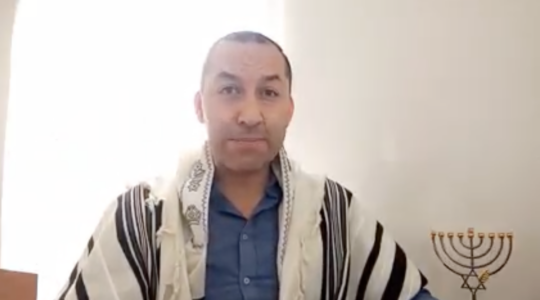
A crowded street in Juba, South Sudan. (Armin Rosen)
JUBA, South Sudan (JTA) – This city in the world’s newest country is not your typical Arabic-speaking capital.
For one thing, most of the city’s inhabitants are Christian. For another, the Israeli flag is ubiquitous here.
Miniature Israeli flags hang from car windshields and flutter at roadside stalls, and at the Juba souk in the city’s downtown, you can buy lapel pins with the Israeli flag alongside its black, red and green South Sudanese counterpart.
“I love Israel,” said Joseph Lago, who sells pens, chewing gum and phone cards at a small wooden stall decorated with Israeli and South Sudanese flags. “They are people of God.”
Many South Sudanese are not just pro-Israel but proudly and openly so. There’s a Juba neighborhood called Jerusalem. A hotel near the airport is called the Shalom.
Perhaps most notable, South Sudan’s fondness for Israel extends to the diplomatic arena, where the two countries have been building strategic ties in a relationship that long preceded the founding of South Sudan last July.
“They see in us kind of a role model in how a small nation surrounded by enemies can survive and prosper, and they would like to imitate that,” Haim Koren, the incoming Israeli ambassador to South Sudan, told JTA.
South Sudan was created last year when its residents voted to secede from Sudan, a country with a Muslim majority and without diplomatic ties to Israel. The government in Khartoum accepted the secession, but in recent weeks a long-simmering dispute over oil revenues and borders has brought the two Sudans to the brink of all-out war.
With Sudan having often served as a safe haven for enemies of Israel and the West, the South Sudanese and Israel have had a common adversary.
In the mid-1990s, Osama bin Laden found shelter in Sudan. In 1995, Sudanese intelligence agents participated in an attempt to assassinate Egyptian President Hosni Mubarak, an ally of Israel and the West. Khartoum signed a military cooperation agreement with Iran in 2008, and in 2009, Israeli warplanes reportedly bombed a 23-truck weapons convoy in Sudan bound for the Gaza Strip.
The first contact between militants from southern Sudan and the Israeli government was in 1967, when a commander with the Anyana Sudanese rebel movement wrote to then-Israeli Prime Minister Levi Eshkol. The officer explained that his militants were fighting on Sudan’s southern flank, and that with some help, the Anyana could keep Israel’s enemies bogged down and distracted.
According to James Mulla, the director of Voices of Sudan, a coalition of U.S.-based Sudanese-interest organizations, Israel’s support proved pivotal to the Anyana’s success during the first Sudanese civil war, which ended in 1972.
“Israel was the only country that helped the rebels in South Sudan,” Mulla told JTA. “They provided advisers to the Anyana, which is one reason why the government of Sudan wanted to sign a peace agreement. They wanted to finish the Anyana movement just shortly before they got training and advice.”
Over the years, there have been reports of the Israelis continuing to aid South Sudanese rebels during Sudan’s second civil war, which lasted from 1983 to 2005 and resulted in an estimated 1.5 million to 2.5 million deaths.
Angelos Agok, a U.S.-based activist and a 13-year veteran in the Sudanese People’s Liberation Movement, recalls that the SPLM’s ties to Israel were kept discrete.
“It was an intricate case, where South Sudan was still part of Sudan, which is an Arab country,” Agok said. “We didn’t want to offend them, and we had to be very careful diplomatically.”
Agok said SPLA leaders traveled to Israel for training. The Israeli government declined to comment on the subject.
Koren says the relationship with South Sudan is consistent with Israel’s strategic interests in East Africa, where state failure and political extremism have provided terrorist groups with potential bases of operation.
“In the long run, we’re expecting that friendly countries like South Sudan could be an ally like other states that are built in a non-extreme way,” he said.
Agriculture is another reason for the alliance. South Sudan’s economic future likely depends on large-scale farming. There was little commercial development in the region during the war years, and the country still imports much of its food from Uganda, despite sitting on some of Africa’s richest potential farmland.
It’s an area in which Israel has deep expertise, and it shares that expertise in ongoing cooperative projects with numerous developing countries.
“We have the initiative and we have the abilities to contribute and to help,” Koren said of South Sudan’s agricultural potential.
Israel already has a small presence in the country in the form of IsraAid, an Israeli NGO coalition. In March, an IsraAid delegation helped South Sudan set up its Ministry of Social Development, which will provide social work-related services for a population traumatized by decades of war.
“Whenever you say you’re from Israel, they’ll open you the door,” said Ophelie Namiech, the head of the Israeli delegation. “When we say we’re Israeli, the trust has already been built.”
Eliseo Neuman, who is director of the American Jewish Committee’s Africa Institute and traveled to Juba with the SPLM when South Sudan was still under Khartoum’s control, says the close ties between Israel and South Sudan could complicate both countries’ relationships with the Arab world.
“The north was blamed by the Arab League generally for fumbling the secession, and some allege that now they have the Zionists on their southern frontier — meaning the South Sudanese,” Neuman said. “Any very overt strengthening of the relationship might be an irritant.”
The relationship faces another potential pitfall: the future of the estimated 3,000 South Sudanese living in Israel who fled to Israel via Egypt during the long civil war.
Israel has struggled with how to handle the migrants and differentiating between those who came seeking refuge from violence and those who came in search of economic opportunity.
Israel “takes its obligations as a signatory to the Refugee Convention very seriously, given the history of the Jewish people and the history of many people who ended up coming to Israel,” said Mark Hetfield, an official at the Hebrew Immigrant Aid Society who in two weeks will become its interim president and CEO. “But at the same time, they need to send a signal to people coming for economic reasons that they can’t sneak into the country under the guise of being asylum seekers.”
In February, Israeli Interior Minister Eli Yishai announced plans to begin deporting South Sudanese who would not accept government financial incentives to leave the country voluntarily.
Hetfield, who is now senior vice president at HIAS for policy and programs, helped oversee a program in Israel that taught job skills to South Sudanese who planned on returning home, but the program was suspended when the threat of deportation loomed.
Hetfield says the group would like the Israeli government to grant South Sudanese a “temporary protected status” that would prevent them from being deported to their unstable homeland.
Mulla does not think that the Israeli refugee issue will have an impact on the broader strategic alliance between South Sudan and Israel. However, he said he has raised the issue of the possible deportations with the South Sudanese ambassador in Washington, and hopes that something can be done to halt the process.
“If Israel decides to deport them, of course it’s going to be devastating,” Mulla said.
Advocates for the Africans are appealing to Israel’s Supreme Court in an attempt to stall or halt the deportations.
JTA has documented Jewish history in real-time for over a century. Keep our journalism strong by joining us in supporting independent, award-winning reporting.





